

Persuasion: Fascinating Study Shows How To Open A Closed Mind. How To Get People To Change (By Encouraging Them Not To) Written by Brad Phillips @MrMediaTraining on May 6, 2014 – 6:02 am People don’t like change.

That’s a generalized statement, of course, but the behavioral science makes clear that change is hard for many people, who tend to stick with familiar but imperfect behaviors rather than cultivate unfamiliar but better ones. So what should you do if you’re addressing a group of people who resist change? One of the best strategies is to convince them that nothing has changed. As an example, I once worked with a woman who regularly presented her company’s social media strategy to her corporate board of directors, a group consisting primarily of older, wealthy men who aren’t engaged in social networks. They didn’t care much about Facebook, Twitter, or Instagram, and tended to dismiss those social networks as something the younger generation used.
Thinking Is Some Of The Hardest Work There Is. Henry Ford, founder of the Ford Motor Company, once said, “Thinking is some of the hardest work there is, which is probably why so few people engage in it.”
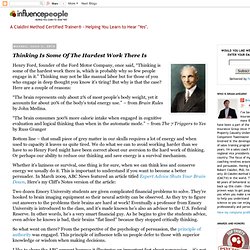
Thinking may not be like manual labor but for those of you who engage in deep thought you know it’s tiring! But why is that the case? Here are a couple of reasons: “The brain represents only about 2% of most people’s body weight, yet it accounts for about 20% of the body’s total energy use.” – from Brain Rules by John Medina. “The brain consumes 300% more caloric intake when engaged in cognitive evaluation and logical thinking than when in the automatic mode.” – from The 7 Triggers to Yes by Russ Granger Bottom line – that small piece of grey matter in our skulls requires a lot of energy and when used to capacity it leaves us quite tired. Here's Why You Should Always Make The First Offer In A Negotiation.
Contrary to the commonly held wisdom, people who make the opening offer in a negotiation have the upper hand.

The advantage is owed to something psychologists call the anchoring principle. It's a cognitive bias where people rely too much on the first piece of information they have. In a salary negotiation, for example, whoever makes the first offer establishes the range of possible variation from that anchor. If you start high, the hiring manager may adjust the figure down slightly. But that's typically a stronger position than starting low and trying to negotiate up. "Most people come with the very strong belief they should never make an opening offer," says Northwestern University management professor Leigh Thompson. How To Become A Great Negotiator. Persuasion Techniques: The One Everyone Should Know. It’s supported by 42 studies on 22,000 people and it’s the easiest, most practical persuasion technique available.
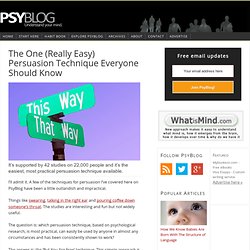
I’ll admit it. A few of the techniques for persuasion I’ve covered here on PsyBlog have been a little outlandish and impractical. Things like swearing, talking in the right ear and pouring coffee down someone’s throat. The studies are interesting and fun but not widely useful. The question is: which persuasion technique, based on psychological research, is most practical, can easily be used by anyone in almost any circumstances and has been consistently shown to work? Sell Your Best Self. The Psychology of Language: Why Are Some Words More Persuasive Than Others? Agreed.
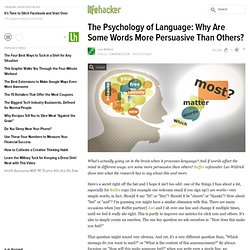
Why Frank Underwood Will Crumble: Creating a Win-Win Always Beats Persuasion and Manipulation. How to make change less threatening: Persuasion, simplification, and “normalisation” through animation. How Apple is brilliantly using a 100-year-old persuasion strategy. Full disclosure: This article was written before we engaged with Apple as a client, so it isn’t influenced or informed by our relationship with the company.
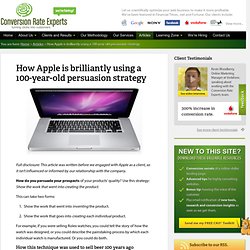
How do you persuade your prospects of your products’ quality? Use this strategy: Show the work that went into creating the product. This can take two forms: Show the work that went into inventing the product.Show the work that goes into creating each individual product. Powerful Presentation Words. I recently came across Words Can Change Your Brain, a book by Andrew Newberg and Mark Robert Waldman.
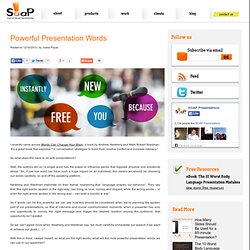
It’s a great book that explores “12 conversation strategies to build trust, resolve conflict and increase intimacy.” So what does this have to do with presentations? Well, the authors tell us “a single word has the power to influence genes that regulate physical and emotional stress.” So, if just one word can have such a huge impact on an individual, this means we should be choosing our words carefully, on and off the speaking platform. Newberg and Waldman elaborate on their theme, explaining that “language shapes our behavior.”
Want persuasive content? Work from the No! A Sweet Nugget to Supercharge Your Personal Influence. Save Time, Persuade with Rhyme! What’s the most famous quote from the OJ Simpson “trial of the century?”
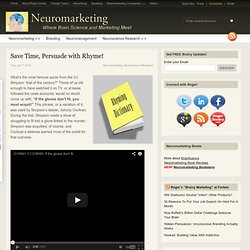
Those of us old enough to have watched it on TV, or at lease followed the news accounts, would no doubt come up with, “If the gloves don’t fit, you must acquit!” Save Time, Persuade with Rhyme! How to cut in line without getting punched. Imagine yourself in the midst of a huge job at a copy machine when someone approaches you and asks, "May I step in?

" You have a lot to do, so you might feel a little bit resistant, and might even say "Wait your turn! " Making the consumer feel like an insider. CONTAGIOUS:WHY THINGS CATCH ONAUTHOR: Jonah BergerPUBLISHER: Simon & SchusterPrice: Rs 499ISBN: 9781471111693 While it might not be obvious right away, Rue La La, a website that carries high-end designer goods and focuses on flash sales in which deals are available only for a limited time, has lot in common with the secret bar Please Don't Tell.

Both used scarcity and exclusivity to make customers feel like insiders. Scarcity is about how much of something is offered. Scarce things are less available because of high demand, limited production, or restrictions on the time or place you can acquire them. The secret bar Please Don't Tell has only forty-five seats and doesn't allow more people than that in. Making the consumer feel like an insider. How to Be More Persuasive in 2014. On a Blog or In the Boardroom, This is Still the Most Powerful Way to Persuade. Emotions & Irrationalities: Self-generation affect effect. “If we figured it out ourselves, we like it better” The self-generation affect effect (or the ‘not invented here – bias’ as people like Dan Ariely phrase it) is the cognitive version of the physical labor-love effect.
Not only does physical effort increase liking, it works just as fine for cognitive effort… We tend to like ideas and information better if it is generated by our own mind (instead of ideas that we read or hear from someone else). Even if people invest just a small amount of cognitive energy in an idea or solution, they like it much more (and not only do we like our own ideas better, we remember them better too, see: self-generation memory effect). Because of the self-generation affect effect, we become overly committed to our own ideas. Why You Should Help Everybody Brag About Themselves. You were probably raised to believe that no one will like you if you talk about yourself all the time. But a body of research shows that you can make people like you by getting them to talk about themselves. The University of Pennsylvania psychologist Adam Grant wrote what might be the year's best organizational psych book, Give and Take to illustrate that giving to people is the primary predictor of career success.
Persuasion Tip: Use the force of “intersecting circles” If you have to persuade people – this tip WILL help you. By day I train persuasion skills to big corporations. By night I have my toughest persuasion battles – yet I’ve started having lots of victories. Blog Archive A Dinner with Drug Reps « Jun 27 Over the years I’ve written all sorts of blog posts on dishonesty, and because the new book release, I want to repost an updated version of them to accompany.
For the next few days I’ll post one every other day. Enjoy! Why You Shouldn't Say "You're Welcome" Four Words That Double Persuasion. Want to double your success in persuading people to do as you ask? Four simple words, and even other phrases with the same meaning, have been shown to double the success rate in dozens of studies worldwide. What are these magic words? Want to Win a Political Debate? Try Making a Weaker Argument. Gun control? The Pain and Pleasure Principle. Every single human being is motivated 1 of 2 ways: move away from pain or go towards pleasure. Utilizing Key Persuasion Techniques in Sales. Believe Me, I Have No Idea What I’m Talking About. How China brainwashed American POWs using a classic sales technique. How China brainwashed American POWs using a classic sales technique. Powerful Persuasion via The Pivot.
How to Accept and Embrace Disagreement: 9 Steps. Edit Article Questions and Answers. How to persuade – by understanding “the ball”